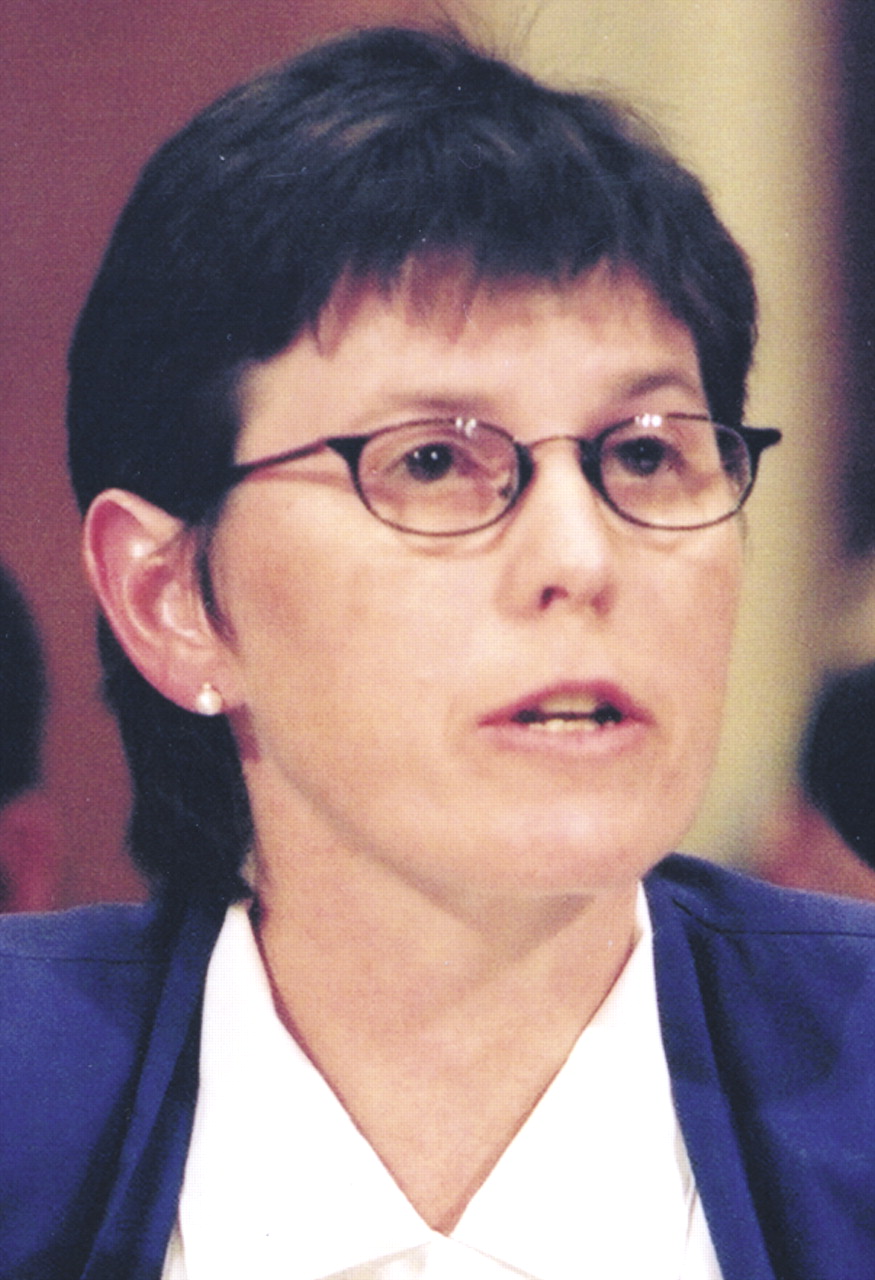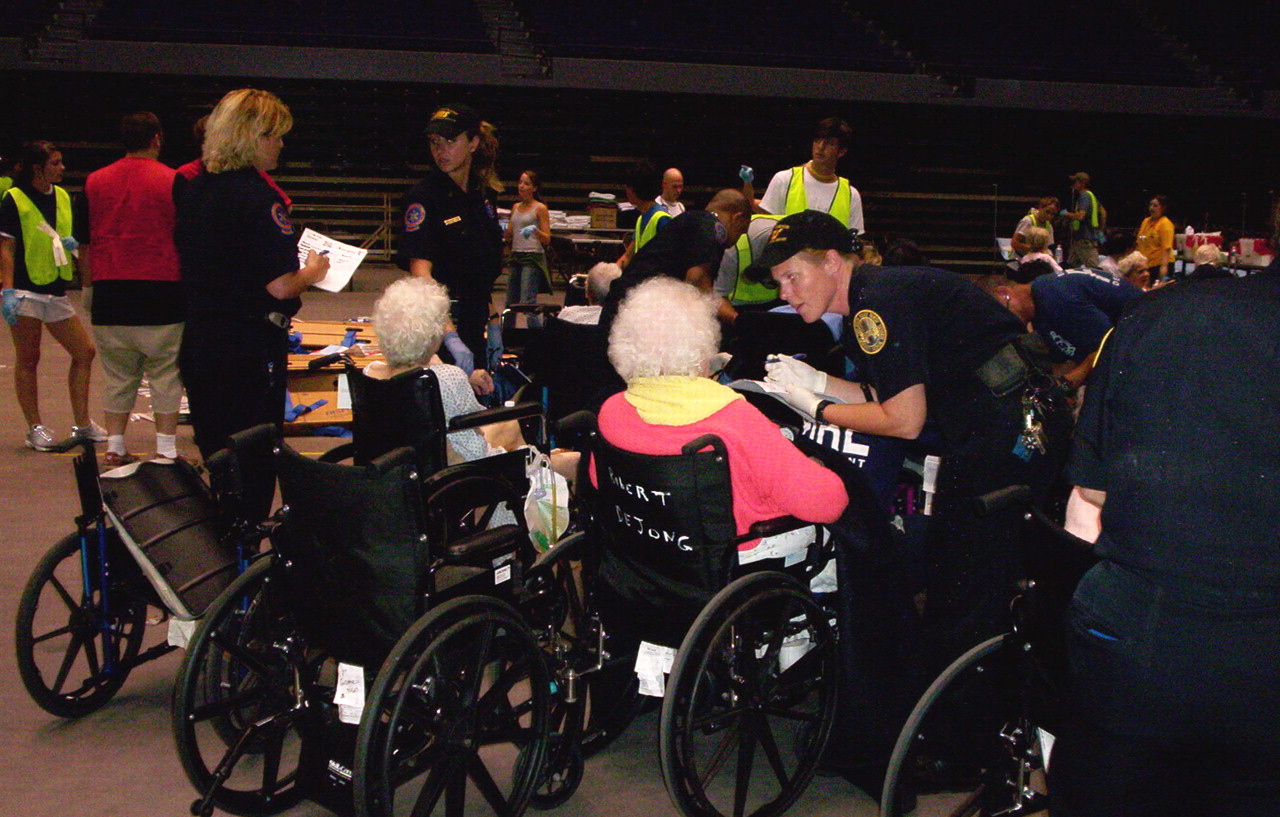Assessing First Responders' Needs Favored Over Formal `Debriefing'

Carol North, M.D.: The scale and nature of a disaster influence a first responder's reaction.

Medical technicians from the East Baton Rouge Parish Emergency Medical System interview elderly evacuees in a shelter in Baton Rouge after Hurricane Katrina swept through the region. Photo courtesy of Mark Olson
Ten years ago, Tommy Loyacono wrote up a plan for disaster staffing of the East Baton Rouge Parish Emergency Medical System. The plan called for his 100-person staff to work 12-hour on/off shifts for up to a week, by which time most emergencies would be over. But Hurricane Katrina upset his best-laid plans, said Loyacono, the system's chief of operations and a spokesperson for the National Association of Emergency Medical Technicians.
The 100 crew members stayed on that schedule for three weeks after Katrina— and then Rita—swept through Louisiana. Evacuees had doubled Baton Rouge's population. Ambulances ran with lights and sirens and still had hourlong transport times through the clogged streets. The 911 system was so swamped with calls that Loyacono had emergency medical technicians (EMTs) set up triage posts in the shelters. He worried about how long his crews could keep up the pace. Three weeks after Katrina, one EMT had simply walked off the job after a trying day, and another was in a psychiatric facility.
“I'd say we have some highly notable stress,” said Loyacono in an interview in late September. “Our people are working long, hard hours. Vacations have been canceled. There's barely time to do laundry and sleep. One woman was supposed to get married. I told her, `Sure, you can get married on Saturday; I'll just move you to the night shift.'”
Hurricane Katrina doubly shocked police, firefighters, EMTs, and other first responders along the Gulf Coast. Many saw their own homes damaged, families displaced, or lives disrupted just like the people they were trying around the clock to help. More than 200 New Orleans police officers left their posts, and two committed suicide after the hurricane.
Emotional Reactions Vary Greatly
Stress on the job is nothing new to those who are first on the scene of emergencies. Their work may be physically draining, demand long hours without sufficient sleep, or expose them to long-term health risks. They may witness mass destruction and mutilated bodies.
Emotional responses to such events are inevitable. Such reactions can range from irritability to depression to posttraumatic stress disorder (PTSD).
The scale and nature of the disaster influence a first responder's reaction, said Carol North, M.D., who studied the mental health aftereffects of the Oklahoma City federal building bombing and the attacks of September 11, 2001. “Bigger is worse than smaller. Human-caused tragedies are worse than natural ones, and terrorism is worse than engineering failures.”
“Professionals have more training and experience and are thought to be a lot less overwhelmed by the event, but there's not a lot of data,” said North, a professor of psychiatry at the University of Texas Southwestern Medical Center in Dallas.
In Oklahoma City, symptoms of PTSD were few immediately following the disaster and decreased a year later. “Only preexisting alcohol abuse or dependence and psychological problems predicted postdisaster mental health symptoms,” she said.
Rescue work is usually accomplished quickly. However, the severity and geographic extent of Katrina's devastation forced public safety workers to be on duty for weeks instead of days. Organizational failures have only added to the stress.
“A lot of people are getting tired of 24/7 operations,” said Anthony Ng, M.D., chair of APA's Committee on Psychiatric Dimensions of Disasters, who spent two weeks volunteering in Mississippi after Katrina.“ Chaos from lack of coordination affects the morale of emergency workers. They're action people. They want to go to work, and they get switched off when they sit around and wait. Many medical teams have spent more time waiting around than working.”
“These are not milquetoasts,” agreed North. “They developed a macho culture in which people don't talk about their feelings.”
Psychiatrists Interview Responders
In the right setting, perhaps, that attitude can change. When New Orleans police officers and firefighters were finally released on leave, they passed though a clinic at the Belmont Hotel in Baton Rouge. After a brief physical examination and vaccinations, they all stopped by the mental health section for evaluation and psychological first aid by a team that included two psychiatrists, Elmore Rigamer, M.D., of New Orleans and Cheryl Person, M.D., of Baltimore.
Team members asked them for basic information, said Person, a postdoctoral fellow in disaster psychiatry at the Bloomberg School of Public Health at Johns Hopkins: How old were they? Were they married? Did they have children? Were their families safe? They told stories about their dual status as victims and responders. Families were in different states, homes destroyed. Their efforts to respond were hampered by communications breakdowns in command. Some had heard the shot when a fellow police officer committed suicide in the next room of a shelter. One firefighter's grandfather had died in an abandoned nursing home. Another's 95-year-old grandmother had spent the night on a bridge.
In general, most of the people the psychiatrists saw were having normal reactions to abnormal developments, said Person in an interview. She could not diagnose PTSD because contact with the officers came so soon after their exposure. Most of their problems related to sleep, for which the psychiatrists prescribed a short course of sedatives. “We tried to depathologize their reactions and give them information on what to expect as time passed,” said Person. “It was a very destigmatizing experience. We left follow-up to them but advised them that if they had any concerns that they should see a psychiatrist.”
Loyacono had some volunteer help for his crew from two clinical psychologists who were among the 100,000 evacuees in the Baton Rouge area. Little relief appeared on the horizon a month after Katrina, though. One crew of out-of-state volunteers arrived, worked one shift, and then didn't show up the next day, which Loyacono attributes to poor coordination by emergency management officials.
What can be done to help first responders during and after such a crisis?
“People everywhere cope by turning to trusted loved ones and friends,” said North. “We need to look at the whole gamut of psychosocial issues, not just PTSD.”
Even before disasters occur, workplaces should offer confidential access to mental health care. Public safety workers often worry that if their concerns reach their bosses, their jobs might be threatened, she said. Alcohol and drug problems must be addressed too, given the heightened risk they create.
Postdisaster treatment can take several approaches. Early symptoms may call for counseling or short-term sedatives to help people sleep and get through the acute stress. North prefers to use nonbenzodiazepines in a population containing possible drug or alcohol abusers, she said. Later, a diagnostic approach can identify major depression or PTSD, which can be treated according to protocol.
Use of “critical incident stress debriefing” is now in disfavor. After a disaster, candidates for PTSD have prominent avoidance and numbing responses and are not ready to face an intervention involving the processing of memories and experience, she said, but it may still have its place among therapeutic options.
“Some people find it helpful,” said North. “It's not intended to treat or prevent PTSD, but it can help them process and share the experience.”
Administrative reforms can also make a difference in public-safety workers' stress load. Good communications from leaders and clearly assigned tasks can help.
The anxiety New Orleans police felt about their families might have been reduced if they had known what happened to their families. The department had no spouses' organization and no off-site personnel database that listed next of kin.
A few days after the storm passed, New Orleans psychiatrist Harold Ginzburg, M.D., J.D., M.P.H., helped set up a confidential e-mail matching system to help families and police locate each other. But by then much of the emotional damage had been done. ▪



